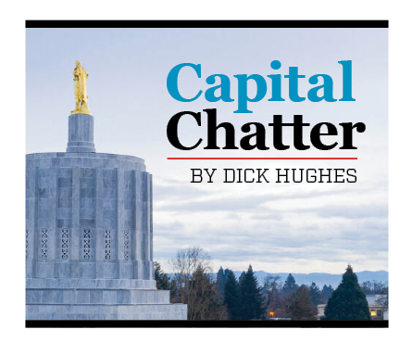Surprise! Oregon has nearly $2 billion extra to spend during the next six weeks.
A stunning state revenue forecast this week defied political expectations and altered conventional wisdom about Oregon’s economy. Much of the projected increase in state tax collections is due to changes in how state economists predict the future.
Oregon operates on two-year budget cycles. The current budget ends June 30. Legislators have passed a resolution to keep state government operating if they can’t finish the budget before then.
Money not spent by June 30 would be added to next budget. The revenue forecast released Wednesday predicted the state already would have an additional $173 million to spend during 2023-25 than was estimated back in February, and $2 billion more in 2025-27.
At her press conference afterward, Gov. Tina Kotek nailed what the bonanza should mean for state government and for local programs it funds, including schools:
“I think the biggest challenge right now is there are going to be a lot of people who will look at those numbers and say, ‘Great. We have a lot of money. Let’s do a bunch of new things.’
“I would say, ‘Let’s do what is in law now. Do it well. Fund the agencies. Fund the staff. Fund the community partners. Make sure they can do the work we have. If we’re going to do a few new things, let’s make sure they’re very targeted – like early literacy – with very specific goals in mind, because that’s how you build for the future.’ This should not be a spending spree on new ideas.”
Within those parameters, Kotek urged the Legislature act boldly.
Here is one long-neglected idea: Align Oregon’s tax policy to match the state’s economic and societal goals.
The 2023 Legislature has invested heavily in the semiconductor industry. What about other industries? How do regulations, taxes and fees, including the Corporate Activity Tax, encourage or hamper them? Should tax reduction be on the majority Democrats’ legislative table? And what should the governor and Legislature do to make Oregon an inviting environment for entrepreneurs and business development?
“In the decade ahead the large Millennial generation will age into their peak entrepreneurship years, likely providing a long-lasting demographic tailwind to start-up activity in the years ahead,” State Economist Mark McMullen and senior economist Josh Lehner wrote in their quarterly forecast. “New businesses are generally considered the primary source of innovation. New ideas, products, and services help propel future economic growth.”
Inflation has shifted many individuals and businesses into higher tax brackets. The economists said they have now changed the forecast model to control for inflation, the state’s fixed income tax brackets and federal tax reforms.
“Unfortunately, inflation traditionally hasn’t been captured very well in our model,” McMullen said during the economists’ presentation to members of the House and Senate tax committees. “The last time we were in this kind of inflationary environment, we didn’t have revenue models. We were still using adding machines to create the economic forecast.”
Rep. Pam Marsh, D-Ashland, called for investing more in worker training. Oregon faces a tight labor market, an aging population and uncertainty about attracting new residents. More 60- and 70-year-olds are continuing to work but fewer teenagers and 20-somethings are entering the workforce.
Lehner said most everybody who wants a job has one. But there are exceptions, and untapped potential, as he explained two years ago on the Oregon Office of Economic Analysis blog:
“Businesses have a wealth of potential employees, if they are able to or willing to hire from disadvantaged populations that have traditionally been excluded from the economy to a greater degree. …
“Specifically, what would Oregon’s long-run labor supply look like if we closed the educational attainment gap between white, non-Hispanic Oregonians and communities of color? How many more workers could local businesses hire if employment rates across all segments of the population were at their historical maximum? What if women were hired at the same rate as men? All three of these potential scenarios address a specific labor market inequity, and in doing so would boost the overall potential of Oregon’s economy, including sales for local businesses and the associated taxes paid to fund public services.”\
Oregon’s economy appears healthy – but not for everyone.
Industries such as timber and high-tech are projected to grow the slowest in the years ahead. The education sector will shrink substantially as school enrollment declines. Brick-and-mortar stores will experience little growth.
Health care and the leisure and hospitality industry are expected to lead job growth during the next two years. However, the economist lowered their projections for leisure/hospitality employment. Proportionally fewer workers will be needed due to such structural changes as hotel rooms being cleaned less frequently and restaurants instituting kiosk-ordering for customers.
The aging population will require more healthcare workers, but Oregon already has a shortage. Lehner and McMullen said the number of Oregonians aged 85 and older will increase about 25% by 2030. Meanwhile, employment has dropped in residential care facilities as families have pulled their relatives out. Is that a temporary adjustment to the pandemic or a long-term trend?
Rep. Greg Smith, R-Heppner, said the state should examine what opportunities exist despite the challenges: “In basic Economics 101, are we going to make horseshoes or are we going to make automobiles, and where is our competitive advantage?”






(0) comments
Welcome to the discussion.
Log In
Keep it Clean. Please avoid obscene, vulgar, lewd, racist or sexually-oriented language.
PLEASE TURN OFF YOUR CAPS LOCK.
Don't Threaten. Threats of harming another person will not be tolerated.
Be Truthful. Don't knowingly lie about anyone or anything.
Be Nice. No racism, sexism or any sort of -ism that is degrading to another person.
Be Proactive. Use the 'Report' link on each comment to let us know of abusive posts.
Share with Us. We'd love to hear eyewitness accounts, the history behind an article.